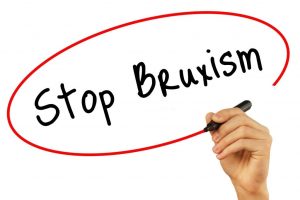
Bruxism is a repetitive movement disorder characterized by routine clenches, grinds, and gnashes of the teeth with the use of the jaw muscles. This condition involves either just the front teeth or all the teeth and might also include facial pain, headaches, and temporomandibular joint (TMJ) disorder.
According to a study made by Dr. Bruno Ella DDS, Ph.D., and colleagues, certain medications can increase the risk of experiencing bruxism. In that case, a mere change in one’s prescription is all that it would take to relieve a person of his symptoms. It might not be the case for all people, though. Some may be needing more help, like taking specific and more stringent measures to relieve him of the stress. These measures vary depending on one’s condition. For those who are grinding their teeth while sleeping, wearing a mouthguard is a good option. For those grinding their teeth when under pressure or nervous, removing the stimuli triggering such intense emotions is the only resolution.
What Are The Types Of Bruxism?
Generally, there are only two types of bruxism, and their differences lie in their causes and symptoms. The first type of bruxism is called Awake bruxism (AB), and this is also called diurnal bruxism. As its name suggests, this type of bruxism happens at the time the patient is awake. And as the day progresses, his symptoms also worsen. AB is more prevalent among women than men. The second type of bruxism is called sleep bruxism (SB), also known as nocturnal bruxism. It happens at night, and the person’s symptoms start to worsen the moment he wakes up.
What Are The Symptoms Of Bruxism?
The symptoms of bruxism are not that severe to cause significant issues. The symptoms also vary and mostly depends on what time of the day they grind their teeth. These symptoms may include any or all of the following:
- Chewed places on cheek or tongue
- Earaches (but no sign of ear infection or ear problem)
- Extremely sensitive teeth
- Headaches (due to teeth grinding)
- Jaw muscle aches
- Neck soreness and pain
- Severe pain on the cheek
- Sleep disruption due to grounding sound
- Teeth damage (like loose teeth, flattened tops, worn enamel, and chips fracture)
- TMJ disorder
How Is Bruxism Diagnosed?
It is usually the person sleeping next to the one suffering from bruxism that gets to notice the symptoms. In kids, it’s usually the parents who observe the symptoms. The noise from all the teeth grinding is the first sign of bruxism. But it would take a dental exam for bruxism to be diagnosed as a medical condition. During the dental exam, the dentist will inspect and look for TMJ, tenderness of jaw muscles, cheek damage, and broken or worn teeth. The dentist might also decide to take a mouth x-ray to know if there is any more serious and deeper damage to the person’s bone tissue.
And since bruxism is also linked to the elevated risk of sleep apnea, the person suspected of having this condition might also be asked to go through a sleep study. Here, his teeth grinding episodes will be evaluated, and any sleep-related disorder might also be determined.
What Are The Causes And Risk Factors Of Bruxism?
There are a couple of reasons why a person grinds his teeth. Aside from this, there are also a lot of factors that increase the risk of a person experiencing bruxism, and this might include any of the following:
- Age: Kids grind their teeth more compared to adults. This is reflected in the fact that 15 to 40% of kids are affected by sleep-related bruxism.
- Emotions: Intense feelings like suppressed anger, anxiety, tension, stress, and frustration are the possible reasons behind a person’s teeth-grinding episodes.
- Genetics: There is a very high chance for bruxism to be genetic. Kids with parents who had this condition are more inclined to inherit such a condition.
- Medication: Various researches show how certain medications cause bruxism. Examples of these medications include Paxil (paroxetine), Zoloft (sertraline), Prozac (fluoxetine), and other antidepressants, and antipsychotics belong to the selective serotonin reuptake inhibitor (SSRI) family.
- Personality: Bruxism is also linked to specific personality traits like neuroticism.
Aside from the aforementioned, substance abuse is also said to be linked directly to bruxism.
How Should Bruxism Be Addressed And Treated?
There are different ways to tackle bruxism. But you have to take note that the right way of addressing it depends on its cause. For instance, if a person’s bruxism is exacerbated or caused by the medicine he takes, then the right way of managing his symptoms is by changing his prescription.

When anxiety or chronic stress makes you grind and gnash your teeth, the best way to deal with the problem is to consult with a therapist. The moment you get to deal with the underlying issues that cause your emotional distress, you will see that your bruxism also abates.
Counselling is also a suitable method for modifying your sleep habits and learning new relaxation techniques. If these options fail to address your teeth grinding episodes, you can also try biofeedback. This method utilizes monitoring equipment and procedures to help you control your jaw muscle activities.
If you grind your teeth mostly at night, then an occlusal splint or mouth guard might be helpful. There are mouthguards that fit over the lower part of your teeth and over it. These mouthguards are designed to keep your jaw relaxed and able to perform other functions.
If the options mentioned above will not alleviate your symptoms, your doctor might suggest some bruxism medications. Right now, there are already a couple of medications for bruxism. However, the data on their efficiency is very limited. Despite this, there are other medications that might help alleviate your bruxism symptoms. Botox injections and muscle relaxants have, in fact, shown positive results as temporary antidotes to the bruxism problem. These options are only limited to bruxism that is not caused by an underlying medical condition or medication.
Bruxism may not be a severe condition that can cause panic, but it can cause significant inconvenience or annoyance to the person suffering from it. It is always best to seek your doctor’s advice as soon as possible to keep the problem from worsening. As they would put it, prevention, early detection, and immediate remedy will always be better than the best cure.

Hi Everyone, BeYoungAholic’s aim is to help women who have lost their self-confidence because of the way they look. We will provide you tips and bits of advice on how to take care of yourself and maintain your youthful look. So, Enjoy the blog!
